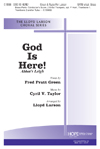252
Church of God, Elect and Glorious
Copyright Information
- Text Copyright
- © 1982 The Jubilate Group, admin. Hope Publishing Company
- Tune Copyright
- © 1942, ren. 1970, Hope Publishing Company
- Reprint/Projection Information
-
Full Text
Scripture References
Further Reflections on Scripture References
Written by James E. Seddon (PHH 15), this text is based on the well-known passage in 1 Peter 2:9-12 where Peter calls the church "a chosen people, a royal priesthood, a holy nation, a people belonging to God" (v. 9). Each stanza of the text begins with one or more of these memorable phrases and then, following Peter's pattern, explains why the church should be such a holy people. Because it is the recipient of God's mercy, the church must be consecrated to holy living as a testimony of praise to God and as a convincing witness to the unsaved.
Confessions and Statements of Faith References
Further Reflections on Confessions and Statements of Faith References
This song speaks of the Church of God as “elect.” The Canons of Dort I, 7 verifies both of these by teaching that “election is God’s unchangeable purpose by which he…chose in Christ to salvation a definite number of particular people out of the entire human race.”
Stanza 1 calls God’s children to “know the purpose of your calling” and in stanza 4 to “fulfill your calling,” phrases that have far greater content than at first glance. Our World Belongs to God, paragraph 41 powerfully explains the mission of the church and helps us realize how far-reaching this calling of the church is: “…the Spirit calls all members to embrace God’s mission in their neighborhoods and in the world: to feed the hungry, bring water to the thirsty, welcome the stranger, clothe the naked, care for the sick, and free the prisoner. We repent of leaving this work to a few, for this mission is central to our being.”


 My Starred Hymns
My Starred Hymns






